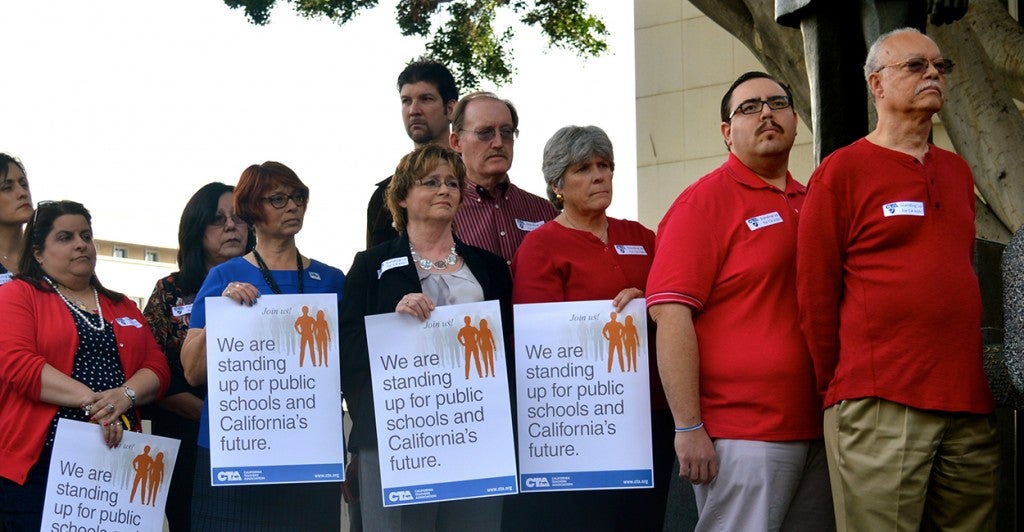Court-ordered reform of California’s teacher tenure program won’t happen without a fight.
The California Teachers Association announced plans to appeal yesterday’s landmark court decision on teacher tenure which, many say, is a victory for students.
The lawsuit, Vergara v. California, aimed to strike down statutes that make it difficult for administrators to dismiss poorly performing teachers, require layoffs based purely on seniority and allow for permanent employment status after 18 months of teaching. These statutes deny children their right to equal education, plaintiffs argued. The court agreed.
Nine students, backed by the nonprofit Students Matter, brought the suit against the state. California’s teachers unions intervened and were a party in the case. Judge Rolf M. Treu ruled in favor of the students. He found all the challenged statutes unconstitutional.
“This decision presents an opportunity for a progressive state with a tradition of innovation to build a new framework for the teaching profession that protects students’ rights to equal educational opportunities while providing teachers the support, respect and rewarding careers they deserve,” said Arne Duncan, U.S. Secretary of Education, in a statement. “My hope is that today’s decision moves from the courtroom toward a collaborative process in California that is fair, thoughtful, practical and swift. Every state, every school district needs to have that kind of conversation.”
The ruling moves teaching in a more professional direction, said Alix Freeze, senior director of communications and advocacy for the Association of American Educators, a non-union professional organization for teachers.
“We believe teachers are professionals. Each teacher has individual strengths and weaknesses, which are better brought to the table,” she said. “These strict tenure laws and one-size-fits-all system [do not] reflect a professional atmosphere where teachers are rewarded for performance and given an opportunity to negotiate their own contracts.”
The ruling can be a case study for the rest of the country, she said—a way to “balance the needs of students with those of teachers.”
About 80 percent of Association of American Educators members responding to a survey said tenure is not necessary for effective teaching, and about 80 percent do not support “last in first out” layoffs, based only on seniority.
The ruling would be hard on teachers, the California Teachers Association said.
“Today’s ruling would make it harder to attract and retain quality teachers in our classrooms and ignores all research that shows experience is a key factor in effective teaching,” according to a union news release. The union did not return calls for comment.
The biggest question going forward, said Joshua Dunn, a columnist on law and education for Education Next and associate director of the Center for the Study of Government and the Individual at the University of Colorado at Colorado Springs, is California’s political response. The court overturned the statutes but did not advise the state on how to revise its education laws.
“It is not the function of this court to dictate or even to advise the legislature as to how to replace the challenged statutes, Treu wrote in the ruling. “All this court may do is apply the constitutional principles of law to the challenged statutes as it has done here, and trust the legislature to fulfill its mandated duty to enact legislation on the issues herein discussed that passes constitutional muster, thus providing each child in this state with a basically equal opportunity to achieve a quality education.”
The state’s education code isn’t workable if these statutes are just crossed off, Dunn said, so it’s up to California’s lawmakers to make revisions. The court decision serves as a forceful, authoritative message to lawmakers to do that.
John Deasy, superintendent of Los Angeles Unified School District, said he hopes lawmakers will act before the legislative session ends.
“There’s no reason in my mind why our legislative and elected leaders shouldn’t be sitting down this afternoon to begin correcting the laws,” he said. “I see no barrier whatsoever for immediacy.”
The legislature is the appropriate place for these types of reforms, said Lance Izumi, senior director of education studies at the Pacific Research Institute, and it’s unfortunate students had to go to trial at all.
“I think if you have a situation like in California where the CTA is the largest-spending lobby in Sacramento and dwarfs any of its contemporaries by a country mile, you end up having a situation where too many lawmakers are controlled by the teachers unions,” he said. “And therefore the odds of getting a reform package through that type of legislature are difficult, and therefore this court case was really a last resort for students.”
Repeated appeals could send the case to the state’s supreme court for a final decision, but that could take a couple of years, Dunn said. If revised laws are passed before then, higher courts could throw out the case as moot: The political process would have resolved the problem.
“If the legislature decrees it agrees with the court and wants to do something to change the laws, it could just change the laws,” Dunn said. “That would mean no one would have to appeal, though you could imagine the teachers unions disliking any reforms passed by the legislature. Maybe they would sue, saying the reformed laws are a violation of their rights.”
